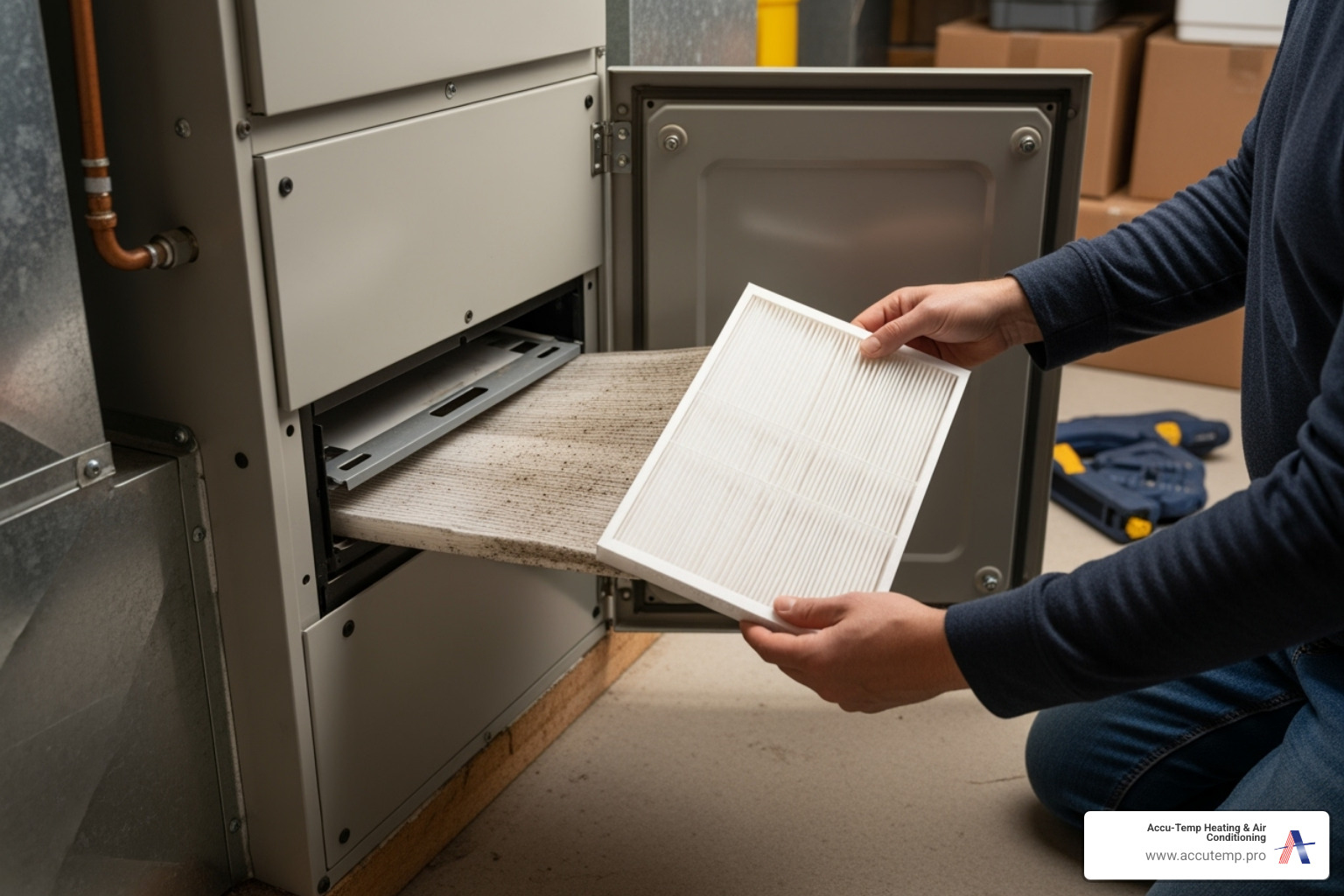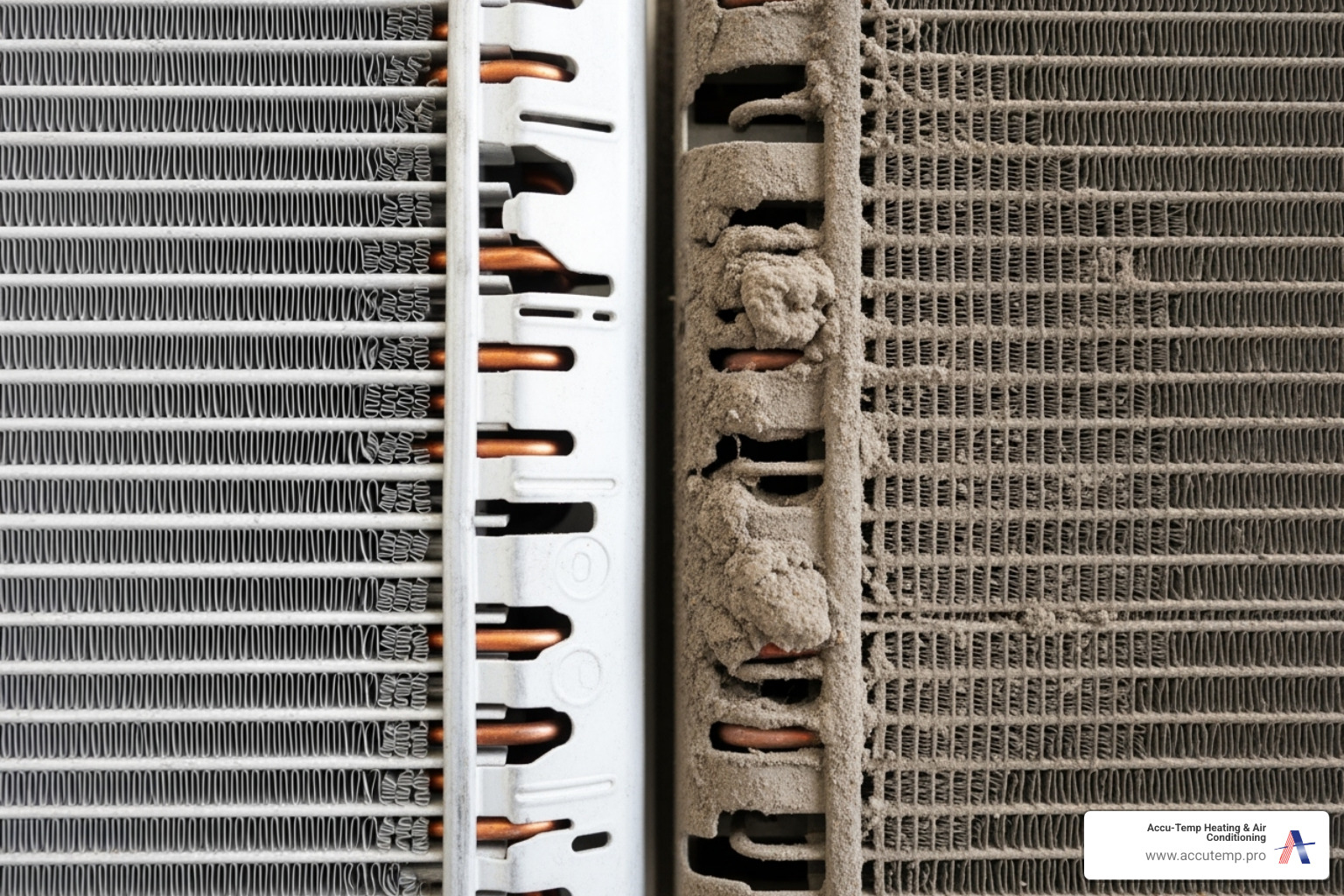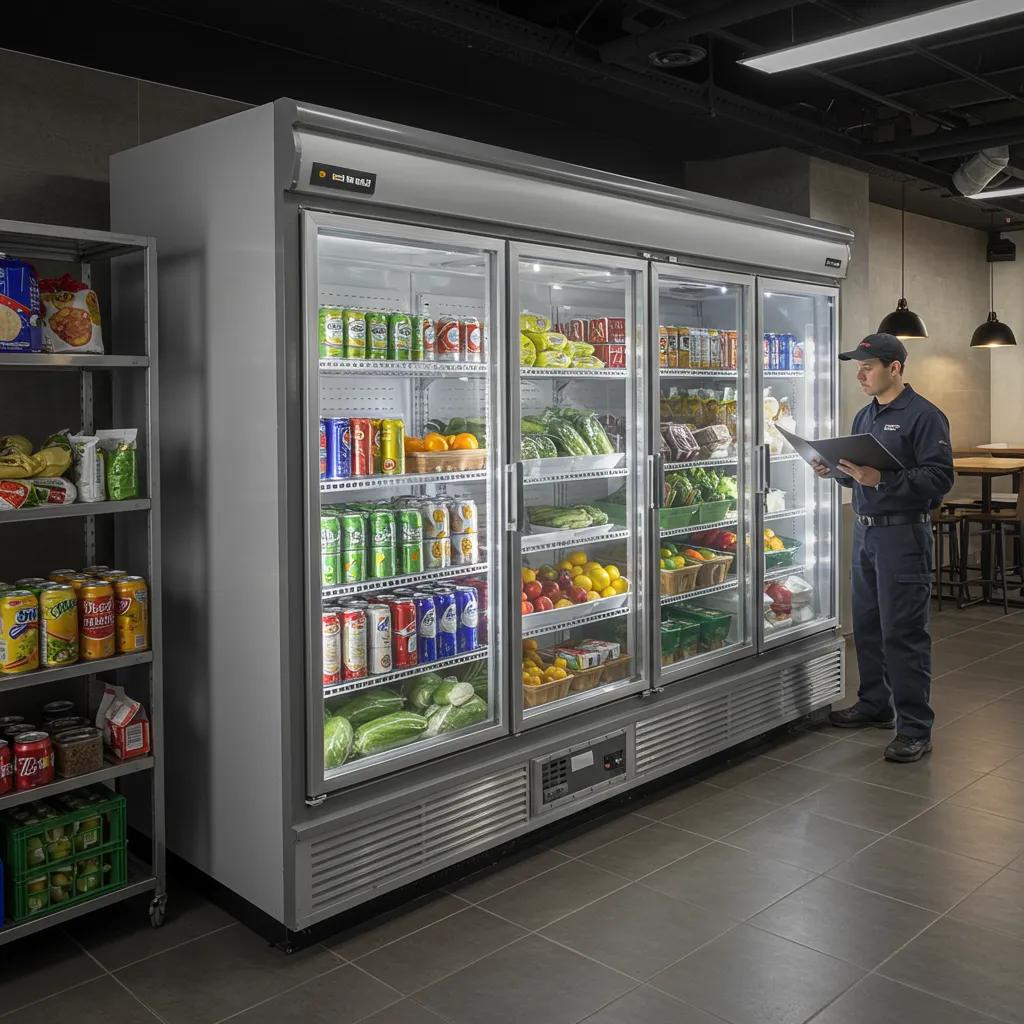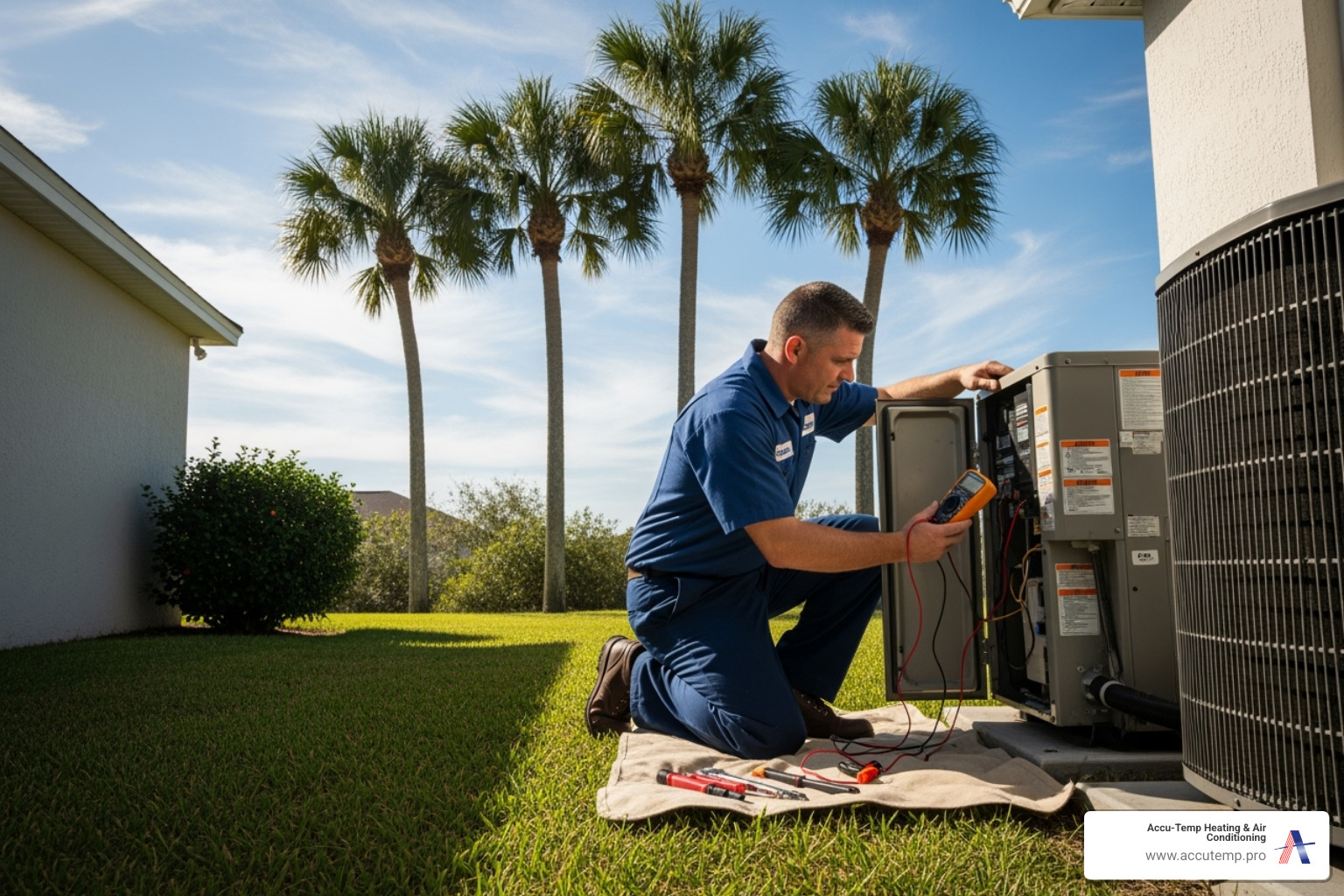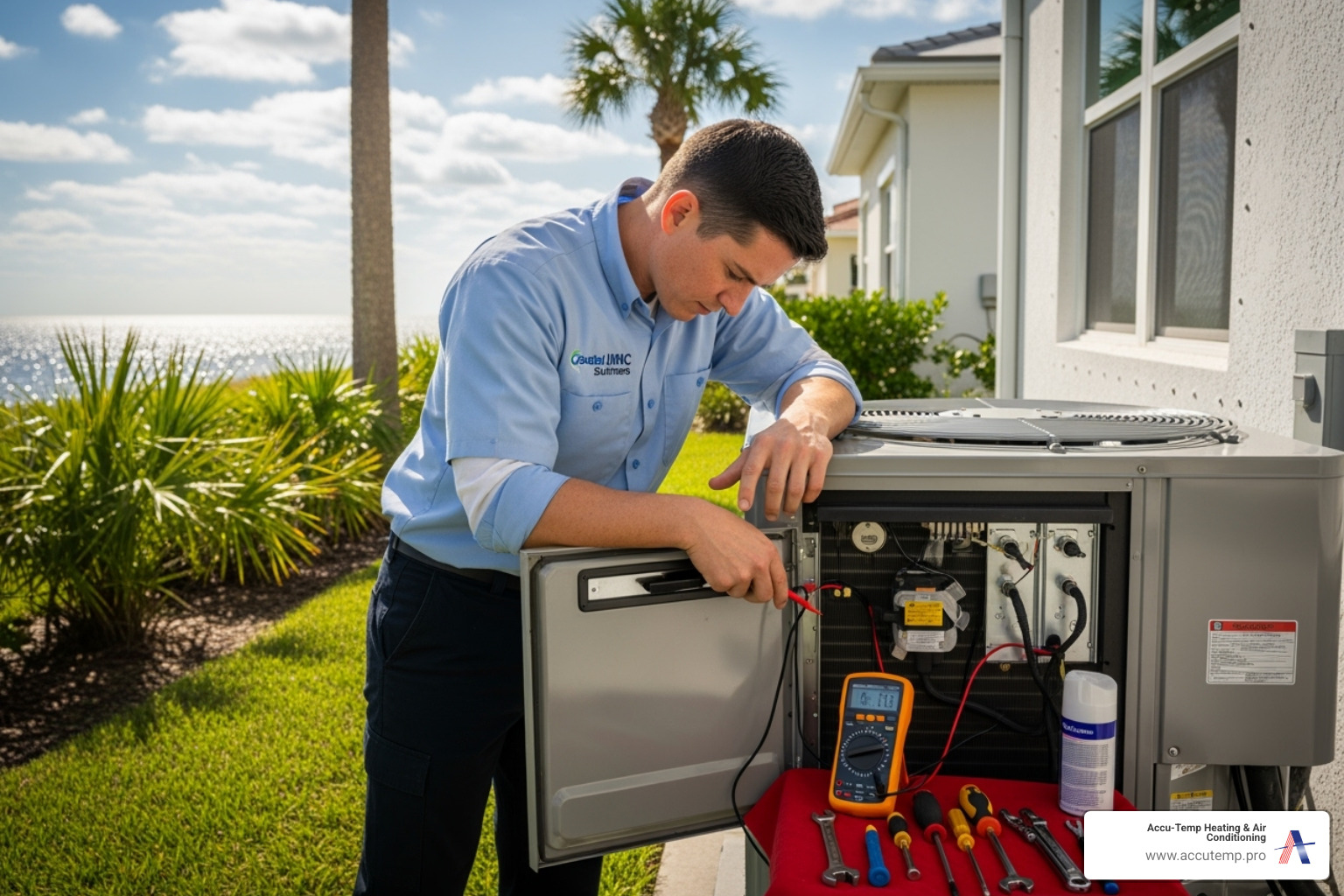When Your Air Conditioner Smells Bad: Quick Diagnosis Guide
Air conditioner smells bad issues are more than just unpleasant – they’re often warning signs of serious problems that need immediate attention. Whether you’re dealing with a musty odor, burning smell, or something that makes you want to evacuate your Palm Coast home, identifying the source quickly can save us money and protect our family’s health.
Common AC Smells and What They Mean:
- Musty/Dirty Socks – Mold or mildew growth on coils or in drain lines
- Burning Plastic – Electrical problems or overheating components (turn off immediately)
- Rotten Eggs – Dead animal in ductwork or serious bacterial growth
- Sweet Chemical – Refrigerant leak (toxic, requires professional help)
- Skunk/Gas – Natural gas leak near system (evacuate and call gas company)
As one homeowner shared in our research: “Most years when we turn our AC on, it has a musty stench to it.” This common experience highlights how Florida’s humid climate creates perfect conditions for mold and bacteria growth in HVAC systems.
The good news? Many AC odor problems have straightforward solutions. Some require simple DIY fixes like changing filters or cleaning drain lines, while others demand immediate professional attention for safety reasons.
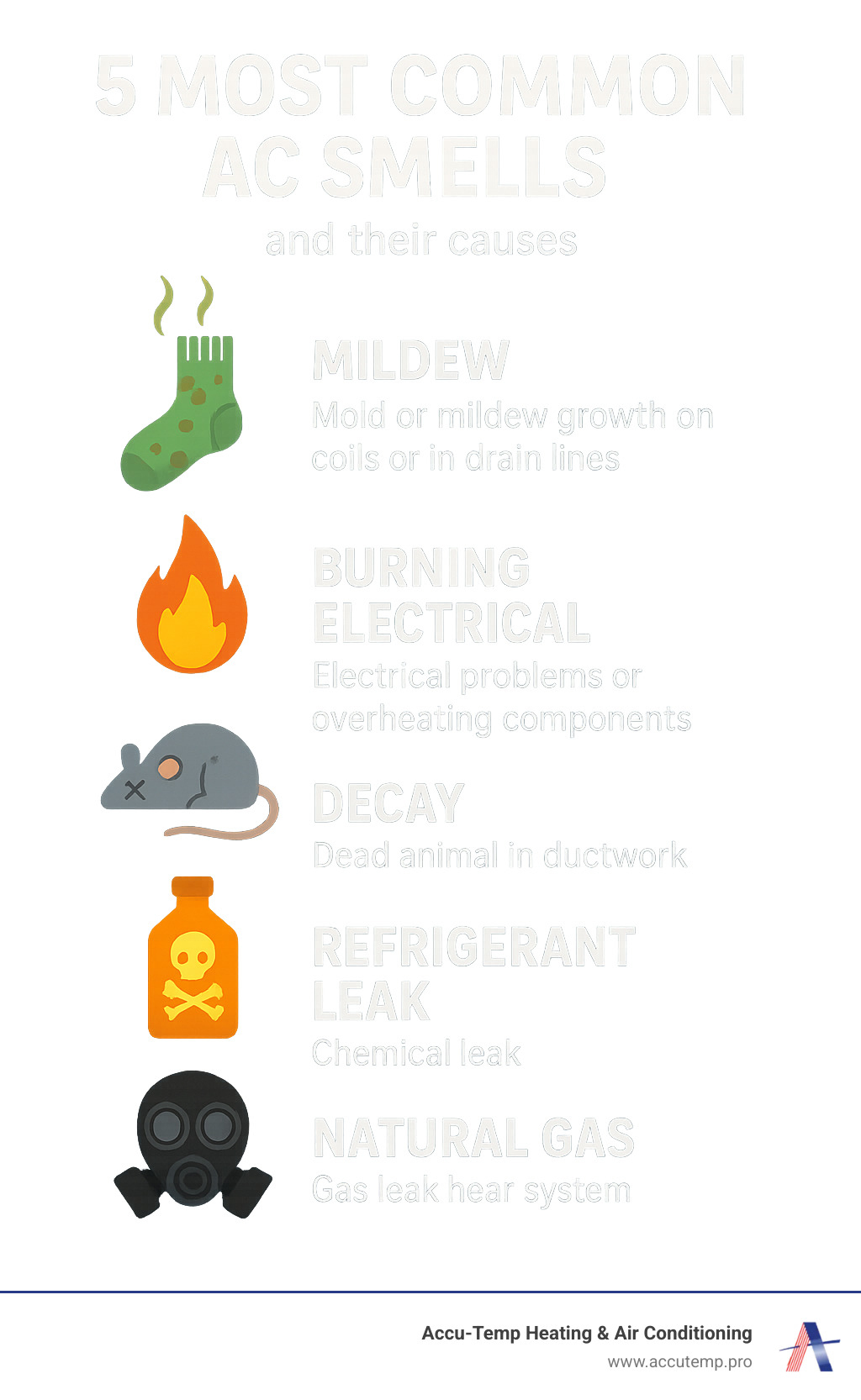
Why Your Air conditioner smells bad: A Diagnostic Guide
When our air conditioner smells bad, it’s our system sending up a flare. Different odors point to different issues—from simple maintenance to safety emergencies. Use this quick table to match what we smell with what to do next.
| Smell Type | What It Smells Like | Common Causes | Health/Safety Risk | What to Do Now |
|---|---|---|---|---|
| Musty/Dirty Socks | Damp, moldy, stale | Mold/mildew on evaporator coil, clogged condensate drain, high indoor humidity, dirty filter | Allergy/respiratory irritation | Replace filter; clean drain pan/line; consider professional coil cleaning |
| Burning Plastic/Gunpowder | Hot, electrical, singed | Overheating motor, frayed wiring, short circuit; dust burning off after long inactivity | Fire hazard | Turn off at thermostat and breaker; call a professional |
| Rotten Eggs/Decay | Sulfuric, decomposing | Dead animal in ductwork or air handler; bacterial growth from pests | Pathogens/poor indoor air quality | Turn off system, ventilate, arrange professional removal and sanitization |
| Sweet Chemical/Chloroform-like | Sweet, solvent-like | Refrigerant leak | Toxic exposure (headaches, nausea) | Turn off system, open windows, call licensed HVAC technician immediately |
| Skunk/Natural Gas | Skunk/rotten cabbage | Natural gas leak being drawn into return/ducts | Extreme fire/explosion risk | Evacuate, avoid electronics, call gas company from a safe location |
Florida’s humidity makes musty problems especially common, while burning, chemical, or gas odors are urgency signals. In the sections below, we break down each smell and the safest next steps.
Why Your Air conditioner smells bad: A Diagnostic Guide
When our air conditioner smells bad, it’s our system sending up a flare. Different odors point to different issues—from simple maintenance to safety emergencies.
| Smell Type | What It Smells Like | Common Causes | Health/Safety Risk | What to Do Now |
|---|---|---|---|---|
| Musty/Dirty Socks | Damp, moldy, stale | Mold/mildew on evaporator coil, clogged condensate drain, dirty filter | Allergy/respiratory irritation | Replace filter; clean drain pan/line; consider professional coil cleaning |
| Burning Plastic/Gunpowder | Hot, electrical, singed | Overheating motor, frayed wiring, short circuit; dust burning off | Fire hazard | Turn off at thermostat and breaker; call a professional |
| Rotten Eggs/Decay | Sulfuric, decomposing | Dead animal in ductwork; bacterial growth from pests | Pathogens/poor air quality | Turn off system, ventilate, arrange professional removal |
| Sweet Chemical | Sweet, solvent-like | Refrigerant leak | Toxic exposure (headaches, nausea) | Turn off system, open windows, call HVAC technician immediately |
| Skunk/Natural Gas | Skunk/rotten cabbage | Natural gas leak near return/ducts | Extreme fire/explosion risk | Evacuate, avoid electronics, call gas company from safe location |
Florida’s humidity makes musty problems especially common, while burning, chemical, or gas odors are urgency signals.
DIY Fixes and Professional Solutions
When your air conditioner smells bad, it’s natural to wonder whether you can tackle the problem yourself or if it’s time to call professionals. Some odor issues have simple solutions we can handle with basic tools.
DIY Fixes for When Your Air Conditioner Smells Bad
Before reaching for the phone, let’s explore simple fixes that often work for musty or mildew-related odors.
Changing the air filter is often our first line of defense. When filters are clogged with dust and particles, they become breeding grounds for odor-causing bacteria. In Florida’s humid climate, check filters monthly and replace them every 1-3 months.
Cleaning the condensate drain pan tackles musty smells at their source. This pan catches water from the evaporator coil. When water sits stagnant, it breeds mold and bacteria. Remove standing water and clean with hydrogen peroxide and water – it’s safer than bleach around copper pipes.
Clearing the condensate drain line prevents water backup and mold growth. The vinegar method works for minor blockages: pour a cup of white vinegar down the T-shaped vent cap, wait 30 minutes, then flush with hot water. For tougher clogs, use a wet-dry vacuum from the exterior end (turn off power first).
Checking for blocked vents ensures proper airflow. When air can’t circulate, moisture builds up, creating mysterious odors.
When to Call an HVAC Professional
Some AC smells are warning signs to step back and call experts. Ignoring these can turn manageable repairs into disasters.
Burning smells demand immediate professional attention. Turn off the AC at thermostat and breaker, then call a certified technician.
Chemical or sweet odors indicate refrigerant leaks requiring specialized equipment and certification. Refrigerant is toxic and causes headaches and nausea.
Gas odors (rotten eggs or skunk spray) represent extreme emergency. Evacuate immediately, avoid electrical devices, and call the gas company from outside.
Persistent musty odors unresponsive to DIY efforts mean deep mold growth requiring professional cleaning.
Animal removal from ductwork requires careful handling to avoid health hazards.
For persistent odors or uncomfortable issues, Accu-Temp Heating & Air Conditioning offers comprehensive AC repair services to keep your family safe and comfortable.
How to Prevent Nasty AC Odors
Prevention is worth more than cure when keeping our air conditioner smells bad problems at bay. Taking proactive steps ensures clean, fresh air in our Palm Coast homes.
Schedule Regular HVAC Maintenance
Our HVAC systems need regular check-ups to perform their best. Professional tune-ups prevent odors and ensure system longevity.
Spring AC check-ups are essential before Florida’s cooling season. During these visits, technicians tackle root causes of AC odors. Coil cleaning is crucial – both evaporator and condenser coils need attention. Dirty coils host mold and mildew while making systems work harder.
Component inspection catches small issues before they become smelly headaches. We check drain pans, lines, and electrical connections.
Best Practices for Homeowners
Between professional visits, simple practices keep homes fresh and AC systems happy.
Regular filter changes top the list. Change disposable filters every 1-3 months or clean washable ones monthly.
Keeping drain lines clear prevents problems. Flush condensate lines with vinegar every few months. Condensate pan tablets from hardware stores inhibit microbial growth.
Managing indoor humidity is crucial in Florida. High humidity breeds mold and mildew. Use dehumidifiers in damp areas and run AC in fan mode briefly after cooling to dry the evaporator coil.
Proper ventilation means checking all vents are open and unobstructed. Blocked vents create moisture pockets.
Keeping outdoor units clear contributes to system health. Trim plants and clear debris around the condenser unit.
A little attention now prevents bigger problems later and keeps homes smelling fresh year-round.
Frequently Asked Questions about AC Smells
Living in Florida’s humid climate means dealing with AC issues, and strange odors are common concerns from our Palm Coast neighbors.
Why does my AC only smell bad when I first turn it on?
This happens after long periods of inactivity, like when first turning on cooling systems at the start of Florida’s season.
During cooler months when AC sits idle, dust and moisture settle on evaporator coils and ductwork. When we flip the thermostat, accumulated gunk gets heated or blown through, creating musty or slightly burning odors.
The good news? If smell dissipates after minutes of running, it’s usually not major – your AC clearing its throat after a nap. However, if odor lingers over 15-30 minutes, there’s an underlying issue like mold growth needing attention.
Can a smelly AC make my family sick?
Unfortunately, yes. Health risks depend on what’s causing the smell.
Mold and mildew odors (musty, dirty sock smell) trigger allergies, asthma attacks, and respiratory problems, especially in kids, elderly, or those with breathing issues. According to the CDC, mold can cause health issues from stuffy noses to chronic lung infections.
Chemical smells from refrigerant leaks are toxic, causing headaches, nausea, and dizziness. Gas odors indicate natural gas leaks – extremely dangerous due to fire/explosion risks and potential carbon monoxide poisoning.
Even decaying animals in ductwork introduce harmful bacteria into breathed air.
When your air conditioner smells bad, addressing the source quickly protects your family’s health and safety.
Is it safe to use bleach to clean my AC unit?
While tempting to reach for bleach, be cautious about where and how you use it.
Diluted bleach solution (1 part bleach to 3 parts water) can clean condensate drain pans, but we advise against using it elsewhere. Bleach corrodes metal components, especially aluminum fins and copper pipes.
Bleach is tricky to rinse thoroughly, potentially leaving damaging residues.
For DIY cleaning, use no-rinse evaporator coil cleaner from hardware stores or white vinegar solution. These are safer and equally effective. Always turn off power before cleaning!
When in doubt, call professionals with the right tools to clean safely without risking expensive components.
Keep Your Palm Coast Home Smelling Fresh
When your air conditioner smells bad, it’s more than just an inconvenience – it’s your system’s way of telling you something needs attention. The good news? Once you identify the specific odor, you can take the right action, whether that’s a simple DIY filter change or calling for emergency service.
Living in Florida’s humid climate presents unique challenges for keeping our homes comfortable and our air clean. Between the year-round moisture and the stop-and-start nature of our AC usage, our systems work harder than most. That’s why staying on top of maintenance and addressing odors quickly is so important for our health and comfort.
Simple issues like dirty filters or clogged drain lines can often be handled with a little elbow grease and the right approach. But serious problems – burning smells, chemical odors, or gas leaks – require immediate professional attention for our family’s safety.
Regular maintenance is the secret weapon against AC odors. Just like we wouldn’t skip oil changes for our cars, our HVAC systems need that same consistent care to prevent problems before they start. A well-maintained system runs more efficiently, lasts longer, and keeps our air fresh and clean.
For persistent odors, visible mold on internal components, or any issue you’re not comfortable handling, we’re here to help. As a family-owned business serving the Palm Coast to Daytona Beach area, Accu-Temp Heating & Air Conditioning understands exactly what Florida homeowners face. We offer comprehensive residential and commercial HVAC solutions backed by our 100% satisfaction guarantee.
Don’t let a smelly AC ruin your comfort or put your family’s health at risk. Schedule your HVAC service in Palm Coast, FL today and breathe easy knowing your system is in expert hands.


